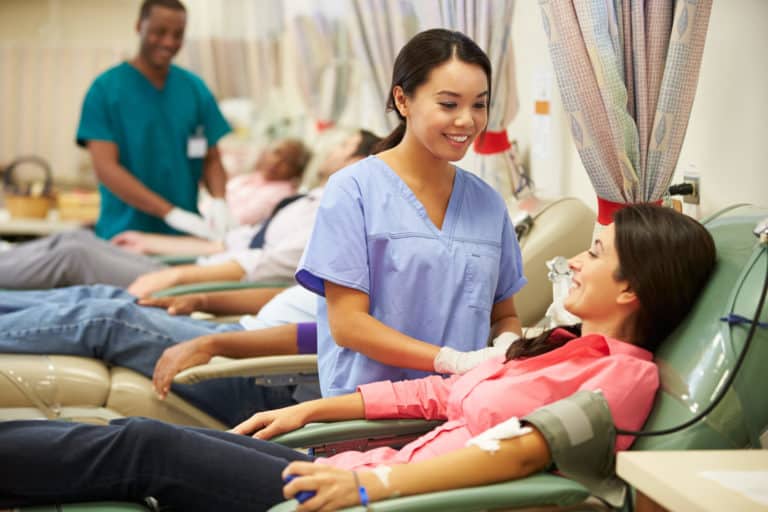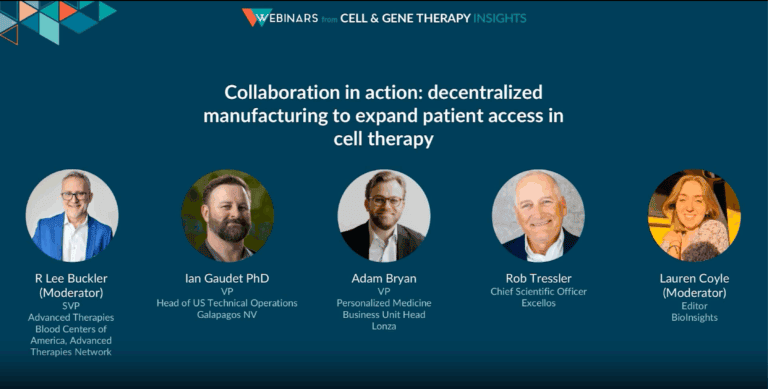Donors play an important role in how well patients respond to immunotherapy, making donor characterization a critical success factor.
Chimeric antigen receptor (CAR) T cell therapy has shown very promising results, helping leukemia and lymphoma patients overcome immune tolerance so that the body can recognize and fight cancer effectively. However, not all cancers can be treated with these therapies, and not all patients will respond to a specific treatment modality. Researchers are always on the lookout for new ways to improve both the universality and efficacy of cell therapies. In this two-part blog series, we will examine the underlying determinants of successful cell therapy treatment, and what methods can be used to increase the likelihood of a positive outcome.
Cell therapy starts with donor characterization
Research has shown that patient response rates to a particular cell-based therapeutic cannot be accurately predicted by patient or disease-specific factors. The answer, instead, may lie with donors, and improved donor characterization.
While currently approved CAR T cell therapies take advantage of the fact that a patient’s own immune cells are usually the safest option, it is also recognized that a cancer patient isn’t necessarily the best donor. When therapeutic cells are derived from the patient (i.e., autologous therapy), the impacts of their disease and treatment can often leave the body exhausted and unable to produce sufficient healthy immune cells for an ideal treatment dose.
Healthy allogeneic donors are a different story. When it is not possible for a patient to supply their own starting material, a donor, usually someone closely related to the patient, is chosen. Donor characterization is performed using a panel of criteria; the most important factor being that they share the patient’s HLA-type. This immune factor will determine the likelihood of the donor’s immune cells triggering a potentially dangerous immune response. Other factors include the donor’s health, medical history, and physiological and behavioral characteristics.
Whether the donor for a cell therapy is the patient or an allogeneic match, scientists still need to understand why some patients respond and others don’t. These answers are inextricably tied to immune cell type, number, and function.
What determines therapeutic success?
A review of recent cell therapy literature reveals that more in-depth donor characterization may be the key to both more accurate research results and higher efficacy for donor-derived cell therapies. A 2018 study published in Nature Medicine [1] examined the relationship between immune cell genomic, phenotypic, and functional factors and therapeutic success or failure. To carry out their analysis, the researchers studied 41 patients with relapsed or refractory chronic lymphocytic leukemia (CLL). Each of these patients had received CD-19 targeted CAR T cell therapy while enrolled in a clinical trial.
In contrast to CD-19 CAR T trials in which 80-90% of acute lymphoblastic leukemia (ALL) patients responded to therapy, only 26% of patients in a comparable CLL trial experienced a durable anti-tumor response. [2] In the current study, therefore, the researchers wished to determine whether the prevalence of certain T cell subtypes and/or biomarkers could be used to predict therapeutic response.
Preliminary analysis confirmed that the degree of response to the CAR T cell therapy did not correspond to patient age, prior therapy, tumor burden, or other typical physiological factors. In the highest responding patients, however, it was immediately obvious that treatment was followed by a rapid and dramatic expansion of CAR T cells, and a concomitant rapid drop in B cell counts. Non-responding patients had a limited degree of in-vivo CAR T cell expansion, and a limited degree of B cell loss.
Since the proliferation capacity of T cells is largely a function of their differentiation state, the scientists proceeded to carry out a detailed genetic and phenotypic analysis comparing CAR T cells from complete or high-partially responding patients to CAR T cells from low-partially and non-responding patients. They found CAR T cells from complete-responding patients with CLL were enriched in memory-related genes, and an elevated frequency of CD27+/CD45RO–/CD8+ T cells prior to CAR T generation. Non-responders, on the other hand, expressed genes related to effector differentiation, glycolysis, T cell exhaustion and apoptosis.
The researchers also performed functional assays on CAR T cells from both sets of patients. While the full array of mechanistic interactions revealed are too complex to describe here, one of the primary findings was that highly functional CAR-T cells produced STAT3-related cytokines. STAT3 regulates the transcription of genes controlling cell survival and proliferation. The cells also produced high levels of IL-6, a cytokine which correlates with CAR-T cell expansion and also with anti-tumor potency.
Overall, the researchers were able to demonstrate that T cell subtype, quality, and functional fitness can be used to predict patient therapeutic response. Excellos scientists have always firmly believed that starting material donors are the key to therapeutic success, that detailed donor characterization is key, and that cell performance is not a matter of luck, but rather one of hard work and preparation.
Please join us next week for Part 2, when we discuss the steps that can be taken to increase the rate of patient response to immunotherapy.
References
- Fraietta JA, et al. Determinants of response and resistance to CD19 chimeric antigen receptor (CAR) T cell therapy of chronic lymphocytic leukemia. Nature Medicine (2018) 24, 563–571 April 2018. https://doi.org/10.1038/s41591-018-0010-1
- Porter, D. L. et al. Chimeric antigen receptor T cells persist and induce sustained remissions in relapsed refractory chronic lymphocytic leukemia. Sci. Transl. Med. (2015) 7, 303ra139 2015 Sep 2018. https://doi:10.1126/scitranslmed.aac5415.

